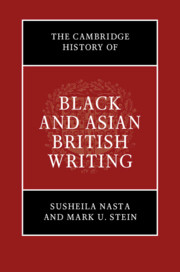Book contents
- The Cambridge History of Black and Asian British Writing
- The Cambridge History of Black and Asian British Writing
- Copyright page
- Dedication
- Contents
- Notes on Contributors
- Preface and Acknowledgements
- Introduction
- Part I New Formations
- Part II Uneven Histories
- (I) Global Locals
- (II) Disappointed Citizens
- (III) Here to Stay
- 19 Sonic Solidarities
- 20 Vernacular Voices
- 21 Narratives of Survival
- 22 Black and Asian British Theatre Taking the Stage
- 23 The Writer and the Critic
- 24 Forging Connections
- 25 Reading the ‘Black’ in the ‘Union Jack’
- Part III Writing the Contemporary
- Select Bibliography
- Index
23 - The Writer and the Critic
Conversations between Literature and Theory
from (III) - Here to Stay
Published online by Cambridge University Press: 19 December 2019
- The Cambridge History of Black and Asian British Writing
- The Cambridge History of Black and Asian British Writing
- Copyright page
- Dedication
- Contents
- Notes on Contributors
- Preface and Acknowledgements
- Introduction
- Part I New Formations
- Part II Uneven Histories
- (I) Global Locals
- (II) Disappointed Citizens
- (III) Here to Stay
- 19 Sonic Solidarities
- 20 Vernacular Voices
- 21 Narratives of Survival
- 22 Black and Asian British Theatre Taking the Stage
- 23 The Writer and the Critic
- 24 Forging Connections
- 25 Reading the ‘Black’ in the ‘Union Jack’
- Part III Writing the Contemporary
- Select Bibliography
- Index
Summary
This chapter examines the vision of key non-fictional essays written by creative writers such as C. L .R. James, Wilson Harris, George Lamming, Salman Rushdie, etc. and puts them in dialogue with the critical and theoretical debates of major literary and cultural critics such as Stuart Hall, Paul Gilroy, Homi K. Bhabha, Avtar Brah, and others. Pointing to shared areas of concern, elements of synergy, and extracting elements which illuminate the historiography of creative and critical exchange, this chapter focuses on particular moments of cultural intervention. It traces how the history and development of this body of writing – which has now gained belated acknowledgement – as well as the literary, cultural, and theoretical debates that have surrounded it are inextricably linked with its political and historical context of emergence.
- Type
- Chapter
- Information
- The Cambridge History of Black and Asian British Writing , pp. 386 - 402Publisher: Cambridge University PressPrint publication year: 2020

